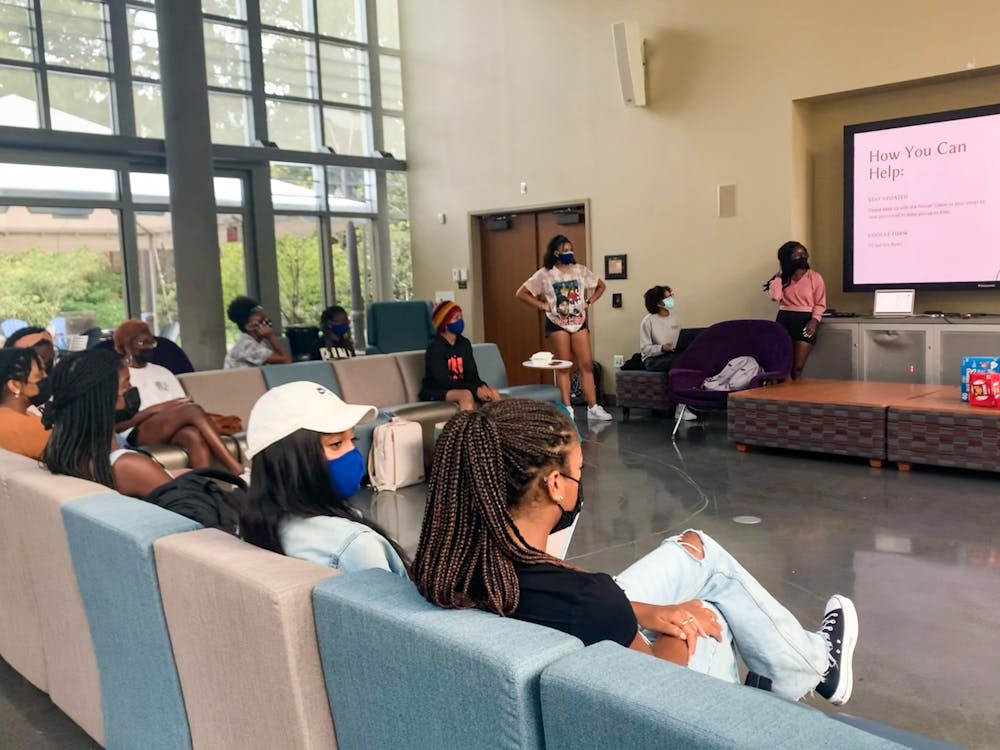From students being asked to move out of their assigned rooms the day before the first day of class to broken promises regarding a house course teaching space, student leaders of the Mitchell-White House are frustrated with Duke Housing and Residence Life.
The Mitchell-White House is a Cultural Living and Learning Community designed to provide a safe residential space for Black students. Junior Kelyce Allen, co-founder and co-director of MWH, said that the LLC’s history of struggle with Duke is “really disheartening and frustrating.”
After Duke demolished Central Campus, home of the Black Cultural Living Group selective living group, students in the Black Student Alliance wanted to make sure there was a Black cultural space on campus, said Kaycee Hailey, junior and co-director of MWH. Student leaders worked hard to organize an LLC, which they decided would be a longer-lasting format for the organization, and were prepared to begin operations in fall 2020.
The pandemic disrupted these plans, so the 2021-22 academic year is the MWH’s first year as an in-person living community. The LLC’s leaders were excited to begin the year with welcome initiatives to get a strong start building community among members. However, housing assignments, which were released during the summer, showed that multiple members’ Student Disability Access Office accomodations and preferences for single rooms had not been met, despite promises from Housing and Residence Life that these issues would be taken care of.
Hailey said that MWH’s student leaders were unable to make contact with HRL for weeks, only hearing back when they looped their faculty advisor into communications.
“Only then do we get a response from housing saying it would be impossible for our original understanding about getting five singles and [SDAO] accommodations to be met,” Hailey said.
“From there, we had meetings with individuals on three different levels within housing, who essentially told us that our preferences were simply not looked at. There was a different section for people to put whether they want a single or a double. That was just never looked at,” Hailey said.
Student leaders in the MWH then scrambled to find a way to meet students’ needs, rearranging rooming assignments and even giving up their own rooms to help accommodate other members. Several students were asked to switch keys and rooms after move-in, and one student had to be moved to a different dorm section to have his preferences accommodated.
“One girl had to sleep with all of her luggage and all of her things just out in the hallway because there were so many mix-ups with housing that she had no place to stay for her first night,” said sophomore Akiya Dillon, a member of MWH.
Dillon was one of the students who was asked to switch rooms after moving in. She said that HRL called her multiple times while she was at work one Friday evening. When she picked up, she was told that she needed to return her key immediately and would be charged if she did not return it.
Dean for Residence Life Deb LoBiondo wrote in an email that she and Residence Coordinator Jordan Viars met with MWH students during move-in weekend. “This meeting helped us clarify student needs and adjust assignments as needed. I am happy to share that we were able to honor all the requests made by the MWH,” LoBiondo wrote.
“While I cannot comment on individual student cases, I can share that all SDAO-approved housing accommodations of members within the MWH were met prior to fall 2021 move-in,” she continued.
‘We literally got the bottom of the barrel for everything’
MWH leaders also expressed concerns at the way their LLC’s section was configured. On the fourth floor of Keohane 4E, where most of the group’s dorms are located, one side of the hallway is lined with doubles and and the other side is lined with suites and a single. All of the doubles on the hallway were assigned to MWH members, and the one suite that is now occupied by MWH members is separate from the rest of the LLC’s rooms. There are also some MWH rooms on the third floor of Keohane 4E.
“Knowing that there was another hallway full of suites that could have been occupied by house members, we could have all been on the same floor. And that’s helpful in order to build a community,” said Rahel Petros, a junior and the LLC’s media relations coordinator.
Additionally, two MWH members were placed in a room that is listed in old floor plans as a single. HRL told MWH leaders that the room is now considered a double and floor plans weren’t updated, but the conditions in the room are cramped.
“It was so bad that when both of those girls moved into that room they couldn’t even pull both of their drawers out at the same time,” Petros said. “And I think that just goes to show that we literally got the bottom of the barrel for everything.”
“The opportunity to engage with the MWH also made clear that HRL should continue to refine and clarify our LLC processes moving forward. Working with our HRL team, we are hosting a meeting with LLC faculty and staff advisors to review expectations, procedures and other information they need to know to successfully support students in our LLCs,” LoBiondo wrote.
Issues securing a House Course classroom
MWH student leaders have also had major issues securing a distraction-free classroom for their house course “History of Us.” They were promised the Keohane Atrium from 5:15 to 7:45 p.m. every Monday; in fact, Petros said, DukeHub and Sakai both list the Atrium as the house course’s location.
Get The Chronicle straight to your inbox
Sign up for our weekly newsletter. Cancel at any time.
MWH leaders confirmed the use of the Atrium with their Residence Coordinator in July, according to Hailey. However, upon arriving on campus, they were told that they would instead be using the third floor common room in Keohane 4E. This space does not have doors, which means that there are constant distractions during the course sessions.
The course was taught in the third floor common room for the first two weeks, and they were able to secure the Atrium for the third week. The MWH leaders were then told that they would not be able to use the Atrium for the following week because it was booked for another event. After ongoing communications, the MWH leaders were told that they would only be able to use the Atrium for certain weeks, Hailey explained.
“We believe that we deserve at least a stable, secure space to teach that is free of distractions,” Hailey said.
The student leadership of MWH decided to host an open forum and presentation on Monday on the history of their LLC being overlooked by the University instead of teaching the normal house course material.
A presentation and demands
Advertising on Instagram for the event, which was titled “What’s going on with the Mitchell-White House?”, announced that “spaces for Black students on Duke’s campus are continuously being undermined, and we need your help to preserve them.”
At the event, student leaders gave a presentation that was broken into four sections: the history of MWH, what they were promised this year, what has been happening instead and a “we want your ideas” slide to foster open discussion.
The students described a lack of transparency and respect for their community, Duke’s lack of accountability and commitment to MWH student leaders and how Duke does not offer Black students safe spaces on campus.
“It gets less forgivable as things keep moving by. Black students are being prevented from taking over the optimal spaces on campus, and it’s just like, we were placed in the house first,” Allen said in the presentation. “And it feels intentional.”
The last slide moved the presentation to an open discussion about how to achieve MWH’s main demands: adequate rooms together on the fourth floor, a guarantee that they could teach their house course in the Atrium and better communication with University administration.
In an interview with The Chronicle, MWH leaders further explained their hopes for the future of the organization.
“We need accountability for what we were initially promised. And regardless of how things have changed [regarding housing policies], we need to be considered as our own entity, because Mitchell-White isn’t like anything else,” Petros said.
“We need to work to figure out what us as a community and us as a house know what is best for us, and we need for housing to actually engage in that conversation work to find a solution instead of just saying it can’t be done,” Hailey added.
Petros emphasized that MWH leadership fully intends for the LLC to be a permanent space on campus.
“Whatever plans they have to change the way Duke housing looks in the future, they need to be cognizant and not intrude on the efforts of the Mitchell-White House because we’re here to stay. You’re not going to tear us down like you tore the BCLG down,” Petros said. “That’s what we need the most. That insurance that we will be respected no matter what changes.”
When asked for comment on the situation, LoBiondo wrote in an email that she “take[s] these feelings seriously and hope[s]” to “continue to have restorative conversations to heal all misunderstandings that transpired since spring of 2020.”
“As I reflect upon the concerns that were brought to our attention, there may have been misunderstandings regarding how specific bedroom assignments are made within our LLCs and how house course room assignments are designated,” LoBiondo wrote.
Alison Korn is a Pratt senior and enterprise advisor of The Chronicle's 119th volume.

Katie Tan is a Trinity senior and digital strategy director of The Chronicle's 119th volume. She was previously managing editor for Volume 118.

Anna Zolotor is a Trinity senior and recruitment chair for The Chronicle's 118th volume. She was previously news editor for Volume 117.

